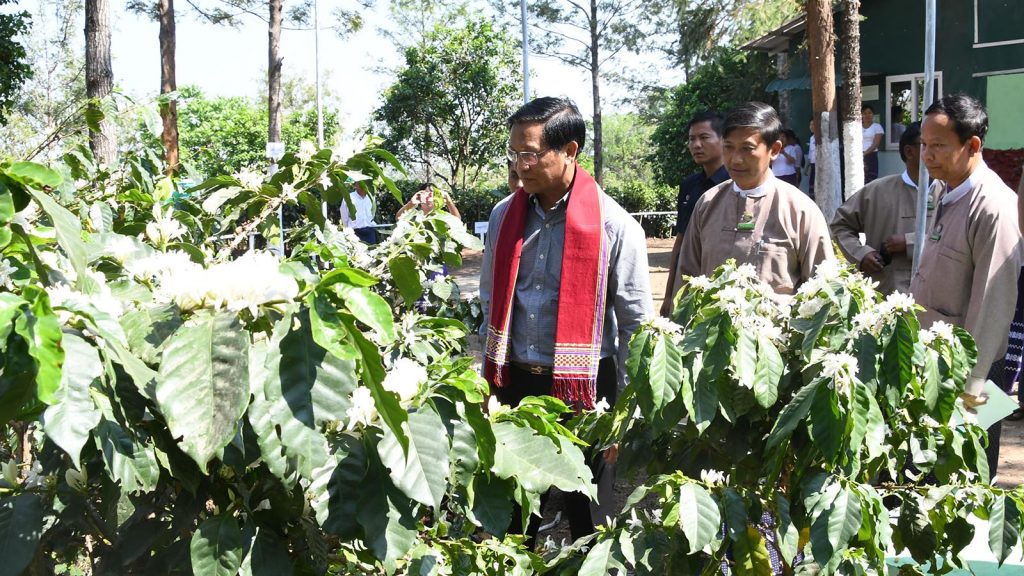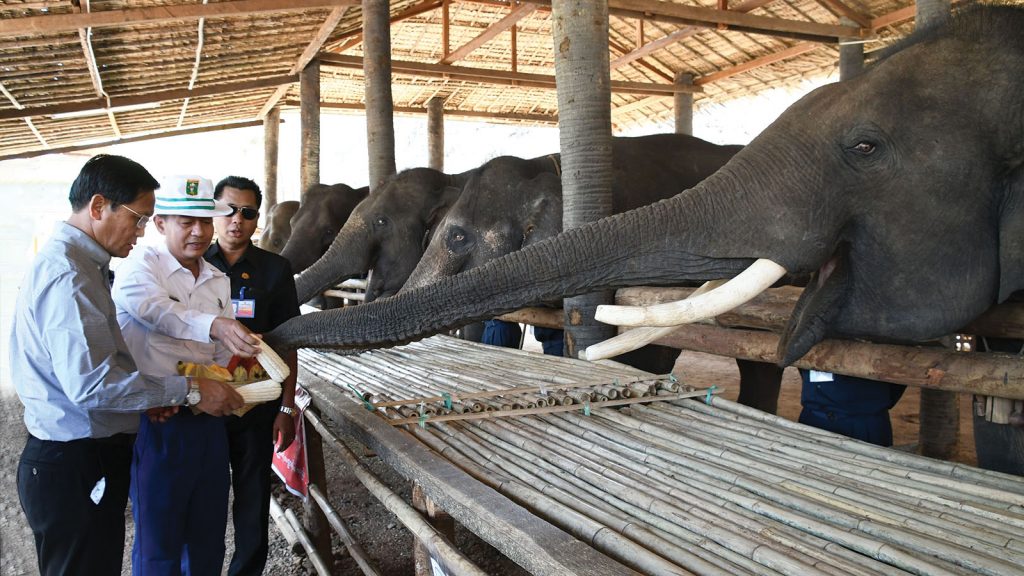Vice President U Henry Van Thio visited the Shwesettaw Wildlife Sanctuary, the Man Creek Elephant Camp, a coffee technology development farm (Natyaygan), and a farm for high-quality cattle breeds in Magway Region on 16 March, and looked into their requirements.
In the briefing hall of the Shwesettaw Wildlife Sanctuary, the Vice President heard a report on biodiversity and establishment of protected areas, the status of forest reserves under the care of the Environment and Wildlife Protection Department, a brief history of the sanctuary and its goal, the salient points of a sanctuary, the conservation of flora and fauna, and benefit to public.

The Vice President led a coordination meeting with the relevant departments for the electrification of the sanctuary, and observed the breeding of star tortoise.
The Shwesettaw sanctuary was established with the aim of protecting and conserving the golden deer (Cervus eldithamin), an endemic species of Myanmar, raising public awareness on protecting and conserving flora and fauna, preserving the catchment areas of the Mann and Mone creeks, carrying out scientific research, and promoting regional development through ecotourism.
Spread across Minbu, Pwintphyu, Ngaphe, and Setoktara townships in Minbu District, Magway Region, the sanctuary has been working to protect and conserve rare species such as golden deer and star tortoise, which are found only in Myanmar, and various species of native birds.
A critically endangered species endemic to the dry zone forests of Myanmar, star tortoises are considered among the most beautiful tortoise species in the world. They are the pride of Myanmar and cannot be found anywhere else on the globe. The Forest Department, the Wildlife Conservation Society (WCS), and the Turtle Survival Alliance (TSA) have been conducting cage-breeding of star tortoises, and releasing them in protected forests.
The Shwesettaw Wildlife Sanctuary is among the 43 conservation areas set up in Myanmar for protecting and preserving the country’s ecosystem and biodiversity.
It is home to 14 kinds of mammals, 146 species of birds, 43 species of amphibians, 39 species of butterfly, 22 species of freshwater fish, 89 tree species, three orchid species, and 26 kinds of herbal plants.
Later in the visit, the Vice President and his entourage visited the Mann Shwestttawyar Pagoda, and donated cash to the Pagoda’s board of trustees.
At the Man Creek Elephant Camp, the Vice President heard a report from officials about ecotourism based on elephant conservation, visions for the camp, its history, salient points, elephant population, services, and income- and profit-sharing arrangement.
After hearing the report, the Vice President said according to the list, Myanmar has about 3,000 State-owned elephants and about 2,500 private-owned elephants. He said he was pleased to see ecotourism based on elephant conservation achieving a certain level of success. He then advised systematic planning to ensure better elephant care for the sustainability of mammals owned by the state and private players. He also toured the camp and fed elephants.
The Forest Department has opened 20 elephant conservation-based ecotourism camps to promote green economy.
The goals of the camps include developing ecotourism, generating job opportunities for mahouts and locals, improving community-based tourism, increasing understanding of the natural habitat, behavior, and diet of the world’s largest land mammals, raising public awareness on flora and fauna conservation programs based on appreciation of the country’s natural beauty, and adding to national income through the green economy.
In the afternoon, the Vice President and his entourage headed to a coffee technology development farm (Natyaygan) in Ngaphe Township, Magway Region, and heard reports on its salient points, production, and exports.
The Vice President spoke of the need to extend the cultivation of coffee strains that have a demand in the international market. He also had a look at raw coffee, coffee samples, and flourishing coffee plantations. During his meeting with locals, he heard their requirements and directed relevant officials on fulfilling them.
Located on a 40.85-acre plot, the farm is growing hybrid Arabica coffee strains. It is distributing coffee saplings in areas to the west of Magway Region and the east of Rakhine State, and conducting mobile courses in those areas.
Later, the Vice President inspected a pedigree cattle farm belonging to the Good Brothers Company at Yaypyae Village, Myothit Township. The company’s owner, U Ha Oo, and officials presented a report on the output and export of dairy products.
The Vice President also took a tour of the farm. He said geographically, the country is lying in the midst of giant markets, and urged departments, entrepreneurs, and local farmers to join hands to extend cattle farming to promote exports and socio-economic development.
Vice President U Henry Van Thio was accompanied by Chief Minister of Magway Region Dr. Aung Moe Nyo, Deputy Ministers Maj-Gen Myint Nwe and Dr. Ye Myint Swe, regional cabinet members, MPs, and departmental personnel. They arrived back in Nay Pyi Taw in the evening. — MNA (Translated by TMT)


